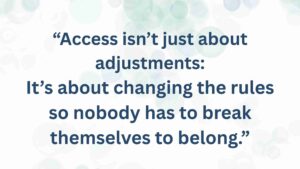Access to Work for Neurodivergent People: What Real Inclusion Requires
August 7, 2025
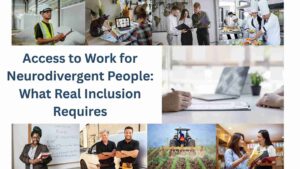
For neurodivergent adults, “access to work” means more than being allowed through the door. It’s about having a clear path into roles that match your strengths, being supported to stay well once you’re hired, and not having to mask your identity just to be seen as competent.
Despite rising awareness of neurodivergence, the job market still operates largely on neurotypical assumptions. From ambiguous application processes to sensory-hostile workplaces and unclear feedback loops, systemic barriers are often invisible to those who don’t face them.
This blog draws together insight from neurodivergent professionals and advocates—including employability coach Vikki Amiss and disability rights advocate Larissa Minner—to explore what real access requires, and how we can co-create it.
What Does ‘Access to Work’ Actually Mean for Neurodivergent People?
Access to work is often misunderstood as a legal or policy concept. But for neurodivergent people—including those with ADHD, autism, dyslexia, dyspraxia, Tourette’s and more—it also means:
- Understanding how and where to apply for jobs
- Having clear, jargon-free information
- Being allowed to communicate and work in ways that suit your brain
- Not being penalised for sensory needs, social differences, or trauma responses
- Having pathways into employment that don’t require endless masking
As Vikki Amiss writes:
“Someone may have a Master’s Degree in Robotic Engineering but may not understand what is required in order to apply for work… you may understand how a robotic arm moves, but not where to look for jobs, let alone apply for them.”
We must stop confusing uneven skills with incompetence. Access to work begins with meeting people where they are—not expecting them to navigate systems designed without them.

The Hidden Barriers Neurodivergent Adults Face
Barriers are rarely obvious. Neurodivergent people often encounter friction where others find flow. Some examples include:
- Job descriptions filled with vague, unnecessary requirements, like “excellent communication skills” for roles that don’t need them
- Shifting application systems, such as online forms and ATS filters, that favour neurotypical language and formatting
- Stigma and outdated assumptions, which lead to discrimination, especially when candidates don’t perform expected social cues like eye contact or small talk
- Anxiety about disclosure, due to fear of being misunderstood, dismissed, or labelled
- Rigid definitions of professionalism, which reward masking and punish authenticity
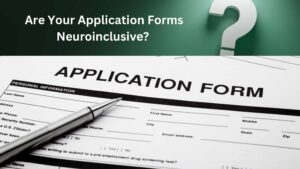
Inclusive Hiring Practices That Work
Larissa Minner, disability rights advocate, offers powerful guidance for creating more inclusive hiring systems. Her advice applies to anyone designing, reviewing, or improving recruitment and onboarding.
-
Job Descriptions and Entry Criteria
- Remove non-essential traits like “excellent communication skills” unless required
- Accept equivalent experience instead of formal education where possible
- Use clear, plain English and avoid jargon
- Reflect the organisation’s real needs—not outdated templates
-
Application and Interview Process
- Provide interview questions or themes in advance
- Offer virtual interviews with clear instructions
- Allow candidates to request changes without needing to disclose a diagnosis
- Break down panel interviews into smaller, less intense sessions
- Use skills-based tasks, work samples, or paid trial days as alternatives to verbal interviews
-
Communication and Feedback
- Communicate directly, avoid sarcasm or ambiguity
- Ask clarifying questions instead of making assumptions
- Provide feedback regularly, with clear criteria for success
- Be mindful that some employees have perfectionist tendencies or require extra processing time

Supporting Neurodivergent Burnout and Executive Function Needs
If we’re serious about retention, wellbeing and productivity, we must create environments that prevent—not just treat—burnout.
Masking—suppressing natural ways of thinking, moving, or interacting—may lead to short-term success but long-term harm. Over time, it can cause neurodivergent burnout, characterised by:
- Brain fog and executive dysfunction
- Increased sensory sensitivity
- Emotional shutdown or depression
- Temporary regression of skills
- In some cases, suicidal ideation
These effects aren’t a sign of weakness. They’re signs that the system is too inflexible—and that the individual has been working overtime just to appear acceptable.
Larissa Minner’s recommendations include:
- Offering executive function tools like visual schedules, timers, and task managers
- Providing sensory aids such as noise-reducing headphones, sunglasses, and low-stimulation workspaces
- Normalising stimming (fidgeting, rocking, pacing) without judgement
- Avoiding strong scents in shared areas
- Offering mental health days and employee resource groups
- Allowing camera-off participation in meetings
- Ensuring promotion is based on merit—not networking or social performance
- Providing notes or summaries after meetings
- Giving plenty of notice for transitions and changes
Small environmental tweaks, like curtains for light control or visual transition tools, can have a big impact.
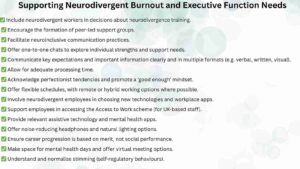
Building Neuroinclusive Workplaces: Practical Culture Shifts
Inclusion isn’t just about hiring. It’s about belonging.
Neuroinclusive workplaces:
- Make social events optional, without social penalties
- Provide quiet rooms or low-sensory spaces
- Let employees signal when they don’t want to be approached
- Use multiple communication channels—visual, written, spoken
- Recognise when an employee is in burnout and reduce workload temporarily
- Tap into individual interests to reignite engagement
- Prioritise training designed by neurodivergent professionals, not just about them
And most importantly: treat neurodivergent team members as experts in their own experiences.
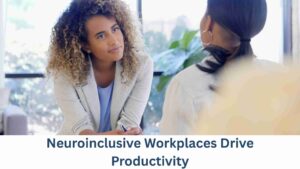
The Access to Work Scheme: Support, Not Solution
The UK’s Access to Work scheme can provide funding for neurodivergent individuals who need workplace support. It can cover:
- Coaching or mentoring
- Travel adjustments
- Assistive software and equipment
- Awareness training for colleagues
- Support workers and needs assessments
However, the scheme is not a substitute for inclusive culture. It works best when embedded in a system already prepared to adapt.
Common pitfalls include long delays, inaccessible forms, and assessors who lack neurodivergence training. At Heal Your Confidence CIC, we guide individuals through the application and help ensure recommendations are truly person-centred.
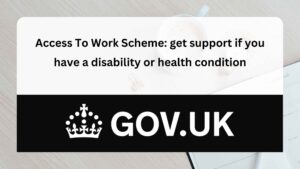
Real Access Means Co-Creation
- Access to work doesn’t mean adding neurodivergent people into rigid structures and expecting them to cope.
- It means rebuilding those structures with neurodivergent people at the table.
- That starts with reimagining:
- What a “good candidate” looks like
- How success is measured
- How we define professionalism
- What supports we proactively offer before there’s a crisis
- At Heal Your Confidence CIC, we don’t just support individuals—we work with teams, businesses, and organisations ready to lead inclusively.
🏢 Bring neuroinclusive training to your workplace 📩 Explore coaching or consultancy: Contact us
